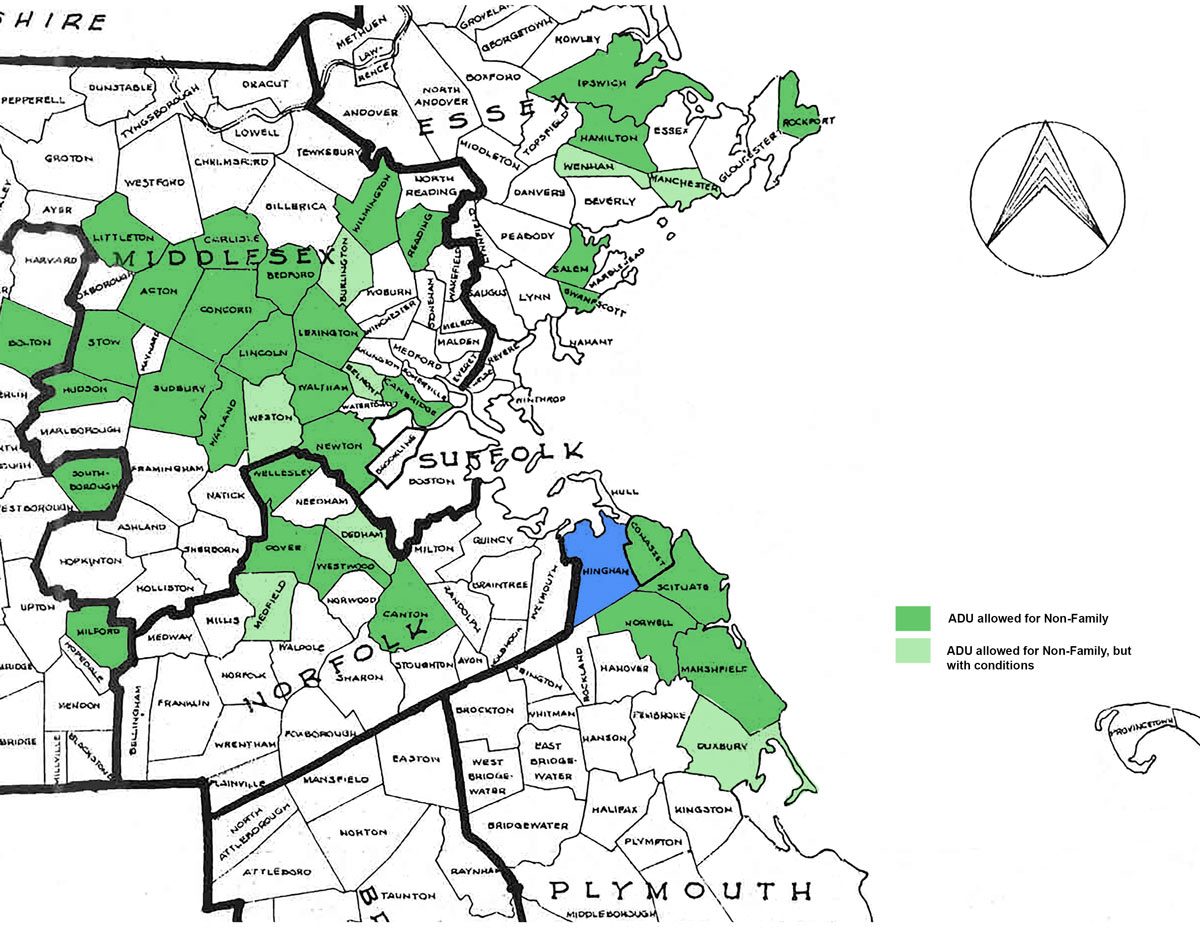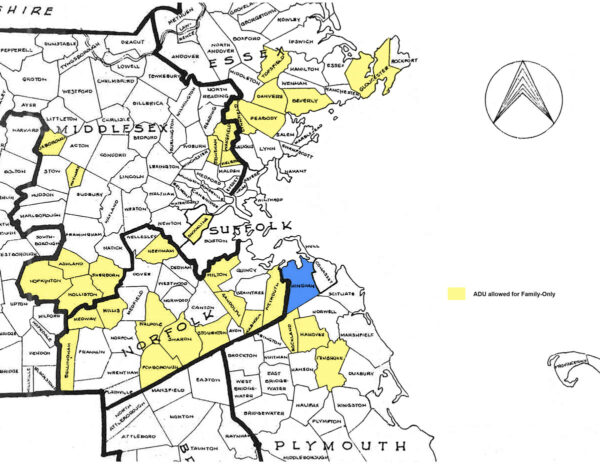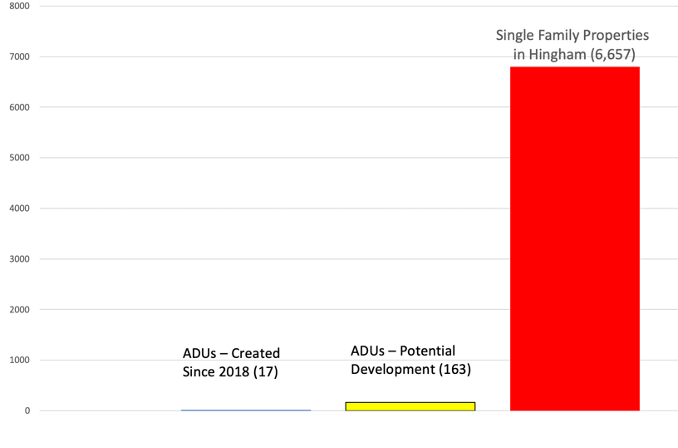***Note: we have retained this information from the Alternate Article 29 ADU website set up by the advocates for that article as a resource for other communities facing this issue. Note that the Town of Hingham voted in FAVOR of Article 29 at Hingham Town Meeting in 2023 and therefore, complying ADUs can be rented to both family AND non-family in this community. ***
Frequently Asked Questions re: Accessory Dwelling Units
What is an Accessory Dwelling Unit?
An Accessory Dwelling Unit (“ADU”) is a small apartment or housing unit on the same lot as a single-family home (frequently referred to as “in-law apartments.”) An ADU can be attached or detached from the principal dwelling. An ADU is owned, bought, and sold together with the principal dwelling on the lot, and at least one of the units on the property (either the ADU or the “principal dwelling”) must be owner-occupied.
Are ADUs allowed in Hingham?
Since 2018, Hingham has allowed attached ADUs by special permit, with the restriction that the unit may only be used by family members of the principal owner or a caregiver (a “familial restriction”). Seventeen attached ADUs have been permitted since 2018; the bylaw allows up to a cap on total ADUs of 2.5% of Hingham’s single family properties, with several eligibility requirements. Based on current numbers, the cap limits us to approximately 163 ADUs.
What did the ADU Study Committee recommend?
- The 2021 Hingham Town Meeting voted to form a committee to review the merits of amending the provisions of the Zoning By-Law reasonably related to the creation of detached accessory dwelling units. The ADU Study Committee was led by a former Planning Board Chair and consisted of seven members appointed by the Planning Board, Town Moderator, Select Board, Commission on Disabilities, Zoning Board of Appeals, Council on Aging and Historic Districts Commission. It held more than a dozen public meetings over the course of a year and received extensive input from Town departments, committees, and residents.
- The ADU Study Committee recommended the Town allow detached ADUs and, by a 6-1 vote, recommended removing the familial restriction, with numerous safeguards in place to prevent burdens on neighbors or Town resources.
What is being considered at the 2023 Town Meeting?
- Article 29 on the 2023 Town Meeting warrant recommends adoption of one of the Study Committee’s two key recommendations, to allow detached ADUs, but omits the other key recommendation, to remove the familial restriction. 6 out of 14 voting members of the Town Advisory Committee voted to remove the familial restriction, as did 2 out of 5 Planning Board members, including its Chair.
- An alternate motion will be offered on the floor of Town Meeting by Judy Sneath, Chair of the Planning Board, to adopt this second of the ADU Study Committee’s two key recommendations: to lift the familial restriction.
Why lift the familial restriction on ADU occupants in Hingham?
- Homeowners’ rights
- Allow the homeowner the right to decide with whom they will share their property.
- Treat all homeowners alike, regardless of their familial relationships.
- Homeowners can currently rent out their homes to anyone – with no family restriction.
- Community Development
- Facilitate low-impact, sustainable housing production, diversity, and affordability in the Town’s neighborhoods without expansion of Town infrastructure.
- Diversity & Inclusion
- Foster greater opportunities for smaller families, young professionals, and the Town’s workforce to become part of the community.
- Accommodate adult children and people with disabilities.
- Demographic Change
- Accommodate evolving lifestyles and multi-generational living.
- Offer more options for residents who wish to age in place. According to a September 2022 needs assessment commissioned by the Hingham Department of Elder Services, estimates suggest that by the year 2035, senior residents will make up 39% of our community’s population. Older adults may be enabled to remain in Hingham thanks to a rental income stream, and may receive help with home maintenance and mobility.
- Follow the AARP’s long standing support for wider availability of ADUs as an affordable, accessible housing option
- Sustainability
- Promote more efficient use of energy, water, materials, and the Town’s infrastructure by increasing housing supply through focused, small-scale development.
- Advance the town’s climate change goals by facilitating lower carbon footprints for residents
- Historic Preservation
- Preserve historic homes, carriages houses, and barns by providing an alternative option to a tear down.
- Recognition of Existing Units
- Establish a means of allowing residents with unauthorized ADUs to comply with health standards and building codes.
Do other communities like Hingham have detached ADUs without a familial restriction?
Yes. Some of the communities where ADUs with no familial restriction are currently allowed include Dover, Cohasset, Lexington, Lincoln, Needham, Newton, Norwell, Scituate, Waltham, Wayland, Wellesley, and Weston. Many require a special permit for all ADUs, while more recent ones, such as Cohasset and Norwell, allow certain ADUs as of right. The proposed by-law in Hingham will require a permitting process.
A survey of a representative sample of those towns presented to the Planning Board found that the permitting process addressed concerns expressed by neighbors, and that they are working well without negative impacts.
Comparison of Boston-Area Towns
Towns with comparable high property values to Hingham’s almost uniformly permit non-family to occupy ADUs to help address aging-in-place and housing cost concerns (green-shaded towns). Generally, towns that maintain a family restriction (yellow-shaded towns) are not towns Hingham considers benchmark/comparable.
ADUs allowed for non-family

ADUs for family members only

Do ADUs align with the Town’s plans/goals?
- The Town’s recent Master Plan and Housing Plan both indicate the need to increase the types of housing options and increase housing overall in Hingham. The Master Plan explicitly states valuing “diversity and inclusion in our community” as a policy goal.
- The Housing Plan explicitly recommends further examination of the use of the ADU bylaw as a means of diversifying housing options. It states that “restricting occupancy to family members largely sidesteps one of the primary purposes and benefits of such units – to provide homeowners, some of whom do not have family, with additional income that may be critical to remaining in their homes.” (Zoning Strategy #1, page 86 of the Housing Plan)
Will ADUs impact the look and feel of Hingham’s neighborhoods or affect neighbors?
The proposed by-law includes extensive safeguards to ensure that neighborhood character and neighbors’ privacy and enjoyment of their property are protected:
- Permitting process will provide ample opportunity for input from neighbors on design, location, noise, lights, etc.
- The homeowner will still live there – they must occupy either the primary dwelling or the ADU
- Maximum size is 875 square feet and setbacks are mandated
- Architectural consistency requirements
- The total number of ADUs that may be permitted is capped at 2.5% of all single family homes in Hingham

Won’t this encourage the proliferation of short-term rentals, such as Airbnbs in Hingham?
No. The proposed bylaw requires a minimum leasing period of 6 months – longer than most other towns – so that rentals are not permitted for short-term stays. The driving purpose of allowing ADUs is to create new, stable housing, not to encourage AirBnbs.
Will ADUs be a more affordable housing option?
Lifting the familial restriction will increase housing options in Hingham. Data presented by the Hingham Affordable Housing Trust during recent Planning Board hearings showed that most comparable small rental listings in Town are at the low end of the rent spectrum and meet state affordability thresholds; and that listed ADU rentals in other towns are also at the low end of the range of available rents. These will be small units – no greater than 875 square feet – and will increase relatively low-cost rental options in Hingham.
For the homeowner, creating an ADU will allow for a potential revenue stream, and/or sharing of household expenses, making an existing home more affordable for senior and other homeowners. Some homeowners (for example, a senior aging in place), might elect to move into their ADU and rent out their principal residence.
According to the Terner Center for Housing Innovation, UC Berkeley, constructing ADUs requires less time and money than other forms of housing. Traditional affordable units can cost nearly twice as much to build.
What are the environmental benefits of ADUs?
ADUs have a small building footprint, no more than 875 square feet. Adding such small units in established neighborhoods addresses our housing needs without creating new infrastructure, increased development, and habitat destruction related to new development.
Will Hingham’s building and zoning requirements apply to ADUs?
Yes. Every new ADU will require a permit, giving neighbors ample opportunity to comment. The ZBA has a strong track record of listening to neighbor concerns in advance of issuing permits. Any dimensional requirements, setbacks, and other provisions of the Zoning Bylaw and Town Bylaws will apply to ADUs, just like they would apply to a single-unit home.
Where in Hingham will detached ADUs be allowed?
ADUs may be built with a special permit in any residential zoning district. ADUs are accessory to a single-family residence only, and only one is allowed on a property.
Can both the principal dwelling and ADU be rented out at the same time?
No. The proposed bylaw requires that the homeowner occupy either the primary dwelling or the ADU as their primary residence.
Where will ADU residents park?
This question is addressed in the special permit process. Parking for the ADU must be accommodated onsite. Hingham’s overnight parking ban does not permit parking on the street overnight.
Can the homeowner live in the ADU while renting out the “principal dwelling”?
Yes. The proposed bylaw intentionally allows the owner to live in either the ADU or the principal dwelling in anticipation that some seniors will want to downsize inside their own homes and rent out the principal dwelling to another person.
How many ADUs will be built in Hingham per year?
The proposed amendment provides a cap of approximately 160. In other similar towns, an average of 3 – 5 are built annually, suggesting we could reasonably expect 30 – 50 over the next decade. Hingham’s experience with attached family / caregiver ADUs has been similar – to date, 17 have been permitted since 2018 (average of slightly more than 3 per year).
How does this bylaw affect current noncompliant ADUs in town?
If a homeowner has an existing detached ADU, it could be in violation of Town bylaws and would remain in violation until brought into compliance through the special permit process. Currently, the Building Commissioner may order the removal of certain features that facilitate permanent residence, such as showers, in any existing ADU that is not compliant.
How would I get permission to build a detached ADU?
Under both the existing and proposed bylaw, creation of an ADU requires a special permit from the Zoning Board of Appeals (the ZBA). The ZBA reviews the application and the proposed plan during a noticed public hearing to confirm compliance with all eligibility, dimensional and design requirements under the Zoning By-Law. The ZBA may then approve the special permit to create an ADU if it finds that the use meets all relevant approval criteria.
The applicant is required to record the special permit decision in the Registry of Deeds prior to issuance of a building permit to complete the proposed construction.
Does the creation of an ADU turn that property into a “two-family dwelling” or “multi-family” housing?
No. Pursuant to Section V-K,2.d of the Zoning By-Law, “a single-family dwelling with an accessory dwelling unit shall not be deemed to be a two-family dwelling.” In Section VI, “multi-unit dwelling” (which is comparable to “multi-family”) is “three or more dwelling units.”)
Notably, unlike a two-family dwelling, a single family home with an ADU cannot be converted to a condominium and the ADU could not be conveyed separate from the single family dwelling.
How would the ADU bylaw be enforced after an ADU is constructed?
ADU owners would be required to submit an annual notarized certification to the Building Commissioner stating that they will continue to occupy either the primary dwelling or the ADU as their primary residence. Upon the sale of a property that has a permitted ADU, the new owner must comply with the conditions of the ADU use and submit a notarized letter to the Building Commissioner within 30 days. If an ADU does not conform with the bylaw, the Building Commissioner may order the removal of certain features that facilitate permanent residence, such as bathing facilities.
Can ADUs be built in new structures?
Yes. Our current bylaw doesn’t prevent a homeowner from putting an addition on their home to create an attached ADU and there is nothing in the proposed bylaw that prevents a property owner from building a new structure in their backyard for a detached ADU. However, all provisions of the ADU application, including owner occupancy, and the Zoning Bylaw still apply.
Why does it matter whether an ADU may be rented to family members only?
As mentioned above, Goal 4 of Hingham’s Master Plan and the Hingham Housing Plan both emphasize the urgency of diversifying our Town’s housing inventory, particularly for more affordable rentals. A detached ADU that may be rented only to family members fails to address this goal. Lifting the familial restriction gives property owners more options and control and allows them to welcome people who may not otherwise be able to afford our community.
Why not “move incrementally” and revisit this family restriction in the future?
- We are facing a housing affordability crisis now. Our Town Master Plan, built on extensive public input through public meetings, stated as one of our Town’s seven priorities that we should focus on increasing the variety and affordability of housing here in Town.
- Goal 1.6 of that Master Plan is “value diversity and inclusiveness in our community.”
- After robust research and discussion, the ADU Study Committee recommended removal of the familial restriction consistent with these Town-identified goals.
- In 2018, Hingham moved incrementally to allow attached ADUs with a familial restriction.
- Voting to allow detached ADUs and lifting the familial restriction is a meaningful next step. Hingham would create an additional, yet limited in number, housing option to non-family occupants, including solo agers, public sector employees, social services professionals, friends, and new neighbors.
- Hingham has explored ADUs as a housing solution for close to 20 years and now has nearly five years of experience with ADUs with a family/caregiver restriction in place. The permitting process has worked well. There is no indication that permitting ADU use by non-family would create any negative impact.
- A large number of our peer towns – well-managed towns with historic pride and high property values – are at least five years ahead of us in allowing homeowners to offer rental ADUs with no family restriction as one means of addressing housing shortages. A survey of six towns by Town staff for the Hingham Affordable Housing Trust showed that any neighbor concerns were addressed successfully at the permitting stage and that no negative issues have arisen from allowing ADUs to be rented without a familial restriction. We know of no contrary data or findings.
- We should not be “kicking the can down the road” once again on this narrow but important initiative.
